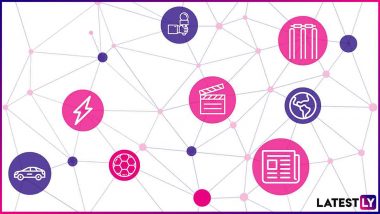Mumbai, Sep 18 (PTI) The National Logistics Policy sets the roadmap for developing a more interconnected and tech-driven framework for building cost and operational efficiency in the sector, industry experts said.
The policy, unveiled by Prime Minister Narendra Modi on Saturday, reflects the government's positive intent to address all the core challenges of the logistics and supply chain industry, Anshuman Singh, the Chairman and Managing Director of Stellar Value Chain Solutions said.
Also Read | UPSC CAPF Result 2022 Declared at upsc.gov.in; Know Steps To Check Score.
It will not only inspire all logistics players to come together and collaborate to build logistics competitiveness globally but also increase the confidence of investors who are keen to invest in the logistics sector, Singh added.
According to him, by realigning the operational dynamics and formulating the pathway to reduce the logistics cost to a single-digit, the policy puts the industry on the cusp of the next phase of growth.
Rizwan Soomar, Chief Executive Officer and Managing Director, DP World Subcontinent said that “the multi-pronged approach by the government adopted in the policy to suggest regulatory and procedural reforms across infrastructure, services and human capital provides a comprehensive strategic direction to the sector and will be a key catalyst in attracting investments.
The focal push for digitisation through platforms like ULIP and E-LogS is crucial to support the designed services improvement framework in improving regulatory inter-operability, standardisation of logistic processes and in bringing the entire multimodal network onto a single digital dashboard, enhancing visibility and transparency for all stakeholders.
According to Vineet Agarwal, MD at Transport Corporation of India, the push towards seamless multimodal transportation and modern connectivity will be a game changer as it will shift the transportation stress from just road to other modes as well.
The Unified Logistics Interface Platform (ULIP) tenant of the NLP will enhance visibility for customers and enable logistics companies like TCI to adopt digitisation at a much larger scale, Agarwal stated.
The new logistics policy will help make the sector an integrated, cost-efficient, resilient, and sustainable logistics ecosystem in the country as it covers all bases of the sector along with streamlining rules and addressing supply-side constraints, said Pranav Goel, Co-founder-CEO, Porter.
The Digital Integration System for logistics ecosystems will lead to seamless and faster work-flow, making logistics significantly efficient, he said.
The e-handbook launched for the standardisation of the warehousing sector, will enable the small and large third party logistics and warehousing players in standardising their processes and automating their systems and processes thus reducing cost and leading to higher profitability, said Lancy Barboza, MD, Flomic Global Logistics Ltd.
“NLP will help the last-mile to be more efficient and faster to fill up the gap of transporter where business can benefit in terms of time and cost,” said Zaiba Sarang, Co-founder, iThink Logistics.
According to Prashant Rane, CEO, Oneworld Logistics, policy has taken a holistic approach towards addressing various pain points of the logistics industry and has laid out a blueprint for systematic growth of the sector.
"The policy aims to provide structure to a highly fragmented and unorganised logistics sector. Tech enabled solutions backed by infrastructure development will provide the much-needed impetus to the sector," he said.
(The above story is verified and authored by Press Trust of India (PTI) staff. PTI, India’s premier news agency, employs more than 400 journalists and 500 stringers to cover almost every district and small town in India.. The views appearing in the above post do not reflect the opinions of LatestLY)













 Quickly
Quickly


